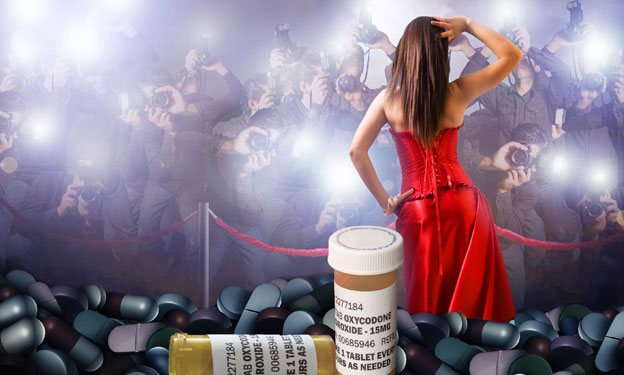The Opioid Crisis in Hollywood: A Current Perspective
Drug dependency, especially opioid addiction, remains a persistent concern across society, impacting individuals from every walk of life, including those in the glamorous world of Hollywood. Despite their wealth and fame, celebrities grapple with the same challenges as anyone else battling addiction, highlighting the indiscriminate nature of this crisis.
The Ongoing Struggle: Celebrities in the Spotlight
- Ben Affleck: Continues to be open about his ongoing journey with alcohol addiction, emphasizing the ongoing struggle.
- Demi Lovato: Navigates recovery while candidly addressing her experiences with addiction and mental health.
- Macklemore: The rapper uses his platform to discuss his past struggles with substance abuse and promote recovery awareness.
- Dax Shepard: The actor and podcast host openly shares his journey with sobriety and the challenges of maintaining recovery.
The Devastating Toll: Recent Losses
Tragically, the opioid crisis continues to claim lives within the entertainment industry. Recent losses include:
- Actor Michael K. Williams: Best known for his role in “The Wire,” passed away in 2021 from an accidental overdose involving fentanyl.
- Rapper DMX: Struggled with addiction throughout his life and died in 2021 following a drug overdose.
- Actor Philip Seymour Hoffman: A highly respected actor, died in 2014 from an accidental overdose involving heroin, cocaine, and other substances.
- Matthew Perry: The beloved actor known for his role as Chandler Bing on the iconic sitcom “Friends,” recently passed away in October 2023. His death serves as a somber reminder of the ongoing overdose crisis and the devastating impact it has on individuals, families, and communities.
Perry’s passing underscores the urgent need for continued efforts to combat addiction and provide comprehensive support for those struggling with substance abuse. It is a stark reminder that even those with access to resources and support can succumb to the grips of this disease.
His openness about his own struggles with addiction helped to destigmatize the issue and encouraged others to seek help. As we mourn his loss, let us honor his memory by continuing the fight against addiction and supporting those in need.
These devastating losses highlight the urgent need for more effective addiction treatment and support.
For over 26 years, people from all over the world have chosen Waismann Method as their opioid detox provider.
We know the challenges you face and the importance of creating a unique and personal experience for you right from the start.Call for Detox Options 1-800-423-2482
The Need for Change: Addressing the Root Causes
Despite access to resources, many individuals, including celebrities, experience relapses even after rehab. This underscores the limitations of conventional treatment models. Why do so many individuals struggle to maintain recovery? If addiction is a chronic disease, why isn’t medical treatment sufficient?
Conventional treatment often falls short by failing to address the underlying mental health challenges that often fuel addiction. Chronic stress, trauma, loneliness, and mental health disorders are pervasive in the entertainment industry and often contribute to substance abuse.
A Comprehensive Approach in Treating Opioid Dependence: Waismann Method®
Waismann Method offers a comprehensive and personalized approach to opioid addiction treatment, prioritizing both physical and psychological healing. It combines rapid detox in a comfortable hospital setting with extensive emotional and mental health care.
A New Paradigm for Opioid Addiction Treatment
Opioid dependency is not simply a medical condition, but a complex interplay of physical and psychological factors often rooted in trauma or underlying mental health conditions. Conventional treatment models, which often focus primarily on medication-assisted therapy, may not adequately address these root causes.
Clare Waismann, Addiction Specialist and Founder of the Waismann Method, emphasizes the importance of a comprehensive approach: “Until the latest advances in medical science and mental health care are seamlessly integrated into addiction treatment in a powerful, scientific, and all-encompassing way, the opioid crisis will persist, potentially paving the way for new drug crises.”
Waismann Method Opioid Treatment Specialists offer a unique solution, combining rapid medical detox in a private hospital setting with personalized psychological and emotional support at their luxurious Domus Retreat®. This comprehensive approach addresses both the physical dependency and the underlying psychological factors, empowering individuals to begin a path for lasting recovery.
Sources:
- Ben Affleck: The actor speaks frankly about everything from his addictive behavior – https://www.nytimes.com/2020/02/18/movies/ben-affleck.html
- Demi Lovato Is Sober Six Years After Her Overdose – https://www.womenshealthmag.com/health/a35634828/demi-lovato-drug-overdose/
- Macklemore Describes Addiction as ‘Like an Allergy’ and Says Recovery Was a Choice Between ‘Life and Death’ – https://people.com/music/macklemore-describes-addiction-as-allergy-recovery-was-choice-between-life-and-death/
- Rapper DMX dead at age 50 – https://www.pbs.org/newshour/arts/rapper-dmx-dead-at-age-50
- Dax Shepard’s Addiction and Path to Sobriety – https://www.usmagazine.com/celebrity-news/pictures/dax-shepards-most-powerful-quotes-about-addiction-and-sobriety/
- Actress Jamie Lee Curtis: now sober for over two decades, Curtis was dependent on Vicodin after first receiving a prescription for the drug following a cosmetic procedure which she said in an interview with Variety “wasn’t really painful.” – https://variety.com/2019/biz/features/jamie-lee-curtis-sober-recovery-addiction-1203392102/






